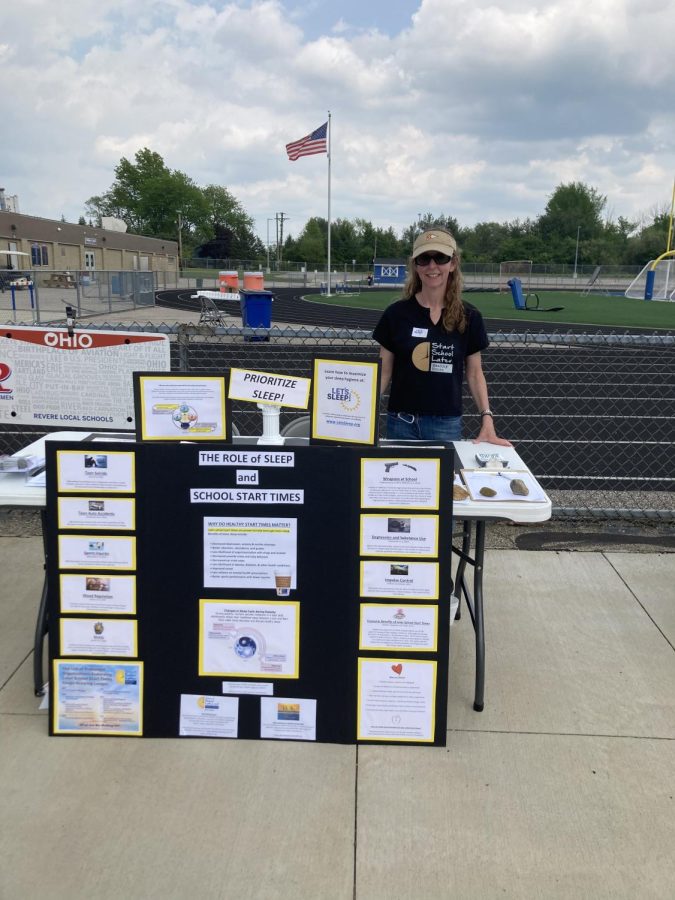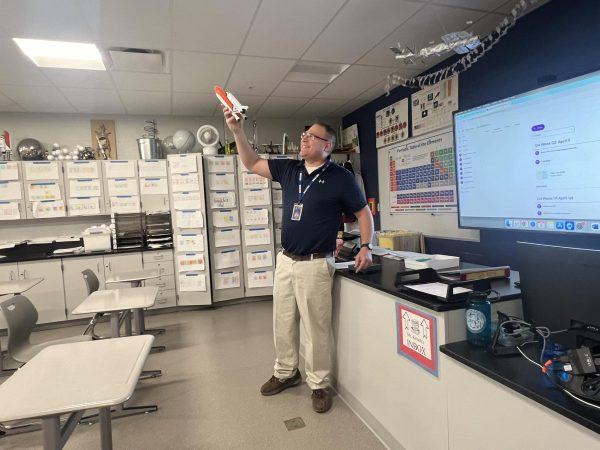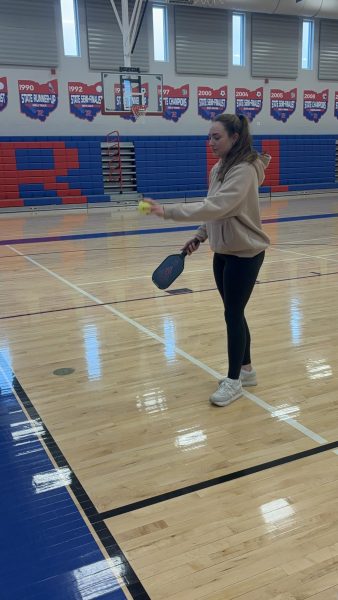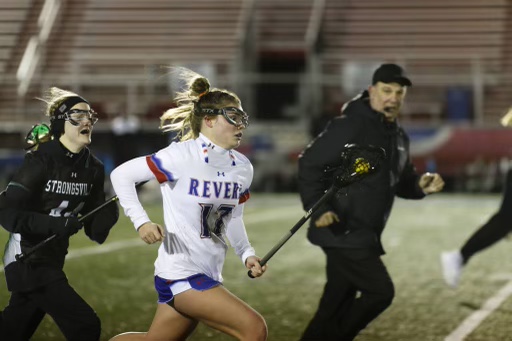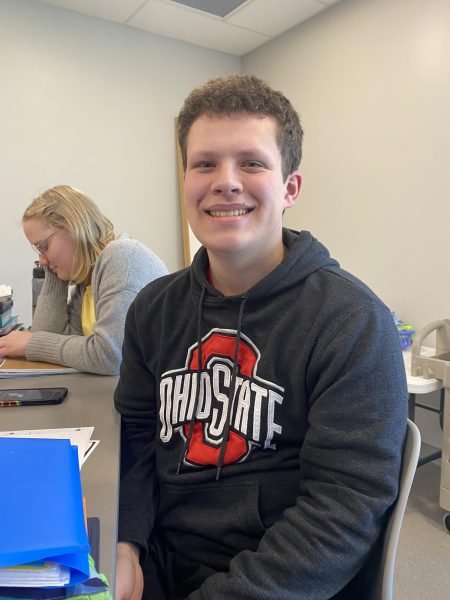Revere alum introduces discussion of school start times
Revere High School and Middle School students must be in their seats ready to learn, whether it be a new concept, take a test or even do a lab, at 7:34 am. Parents, students and community members have raised questions on why students must be active and alert for a new day at school at this specific time. When President of the Revere Schools Foundation, Revere graduate and now Revere parent Dr. Zach Mellion asked this question, he always seemed to get the same answer.
“The school time is the exact same as it was when I was there, but nobody seems to know why. It’s just, ‘oh, it’s always been that way’,” Mellion said.
Mellion conferred with Superintendent Dr. Michael Tefs about the same question, and he got the same response.
“The one question that he has presented [is], “Why do we start at 7:30? Why don’t we start at 7? Why don’t we start at 8?” Why do we start at 7:30? And here’s the answer everybody gives me: ‘it’s because we always have’,” Tefs said.
Mellion began to examine the question more and during the April Revere Schools Board Meeting, he spoke about the effects that a later school start time could have on the students at Revere.
At the board meeting, Mellion talked about the sleep cycle of middle and high school students and how it is different from adults.
“Adolescent sleep cycles begin to change when kids enter middle school and high school years, and our current school start times actually move them earlier in the day as opposed to later, so their circadian rhythm, the way their body operates, moves back about three hours,” Mellion said.
The internal clock of an adolescent changes during puberty and differs from that of a grown adult. Their sleep schedule is moving forward about three hours. Mellion explained what it is like for teenagers to wake up as early as they have to.
“We’re asking them to be up and alert and ready to study and learn when really their brain is still on California time if we’re talking about Ohio,” Mellion said.
Tricia Steiner, another Revere parent, has been a member of the Start School Later organization since 2019 and explained how the adult and teenager sleep schedules compare to each other.
“Asking a teenager to wake up by 6 am is like forcing adults to wake up by 3 am,” Steiner said.
Melatonin is the hormone released into the brain that makes a person fall asleep. When students grow into adolescents, their melatonin shifts and differs from that of elementary students and adults. Steiner explained why it is physically difficult for adolescents to get up so early in regards to melatonin.
“You [adolescents] do not physically or biologically release melatonin . . . until about two hours later than an adult or a younger child does. that’s why it’s harder for adolescents and teenagers to physically fall asleep and then it also shifts their time to wake up in the morning. An adolescent doesn’t start to want to fall asleep until around eleven o’clock, and then they don’t stop releasing that melatonin until around nine am,” Steiner said.
Changing just sleep can already have a positive effect on a student’s mental health and wellbeing. Students need sleep, especially during their adolescence, because it is the most susceptible time in their lives to develop mental illnesses. Steiner explained the importance of sleep and the changes it can entail.
“We had a huge mental health crisis before the pandemic and now it’s been exasperated, and sleep is just one of those things, but it’s a really easy thing to fix. Everybody needs sleep, and if people understood how important sleep was and the role of all of those other issues that we have as humans, it would really improve the mental health and wellbeing of adolescents in particular who have a different sleep cycle than adults,” Steiner said.
Mellion spoke about the amount of sleep that students should be getting, versus the amount of sleep the majority of them are getting.
“Literature and statistics show that seventy plus percent of kids get less than eight hours of sleep and the recommended amount of hours is nine,” Mellion said.
Mellion also discussed how the start times have been moved up earlier and the changes it has caused.
“100 years ago, school start times were typically around 9 am; around 95% of kids did not wake with an alarm clock. Today, the opposite is true; almost all kids in middle school and high school get woken up with an alarm clock,” Mellion said.
Steiner spoke about a website, startschoollater.net, that she got most of her information from and spoke about what it is. It is the website of a national organization that started when research began on sleep during the 1990s. The organization is made up of chapters of researchers, parent advocates and school administrators who want to create change.
Mellion also received information from the website and feels that the district should explore the idea of later start times.
“I just think that our district and our school board should entertain and look into a little bit more because I feel as a parent and a community member that if our goal here is to educate our children that we should be looking at the best way to do that,” Mellion said.
Before Mellion went to the board meeting, he spoke with Tefs about this issue. If the time change were to be implemented at Revere, Tefs explained how he believes the new schedule would work.
“I would anticipate that the day just shifts. I don’t know that you would just lop off 20 minutes a day and still get everything that needs to get in your schedule,” Tefs said.
Tefs recommends that the district shift the times around a half an hour forward in order to start at 8 am. Mellion believes that an 8:30 am start time would work best for the administration while still helping the students, while Steiner believes that the earliest possible start time would be 8:30, but students should start school around 9-9:30 am or even as late as 10. Although administration has not established a specific time, all three agree with the research that says a later start time could help students.
There are many ways to change the start times, including one way that Tefs explained would not work for our district, a flipped model that involves the elementary school.
“I don’t have an interest in . . . a flipped model to where elementary goes first and high school goes second. I am not interested in that only because we have many families where the high schooler gets home and assists the younger student off the bus and even, maybe, at times, provides childcare,” Tefs said.
For this new policy to gain traction, Tefs said that the board of education must be involved in the process. No one spoke on the topic during the May board meeting, but the superintendent hopes to bring more of a plan to the upcoming meeting in late June. Tefs explained his general plan for early summer.
“It’s going to take time, and with school shut down for June and July and the first part of August, we’ll start to develop a Gantt chart. We have a draft of that started. . . so we’ll bring that to the June board meeting,” Tefs said.
A Gantt chart is a type of bar chart that helps plan specific dates and organizes different important check points for a project. Mellion mentioned that when changing school start times the process usually takes about two years until the system goes into operation. Tefs agreed with this and said that the earliest Revere would move back its start times would be the 2023-2024 school year. Tefs elaborated on a rough plan that fits this time frame.
“Any process that we do will start next year, it will start in August. It’ll be a year-long process, probably at least four to five months. If we were to change anything, we really would want to have that done by probably the February, March time frame so that we could create materials, publications [and] student handbooks for the following year,” Tefs said.
With any plan that may form, Tefs believes that one of the most important aspects of this project is student voice. Tefs explained the importance of the students in this.
“What’s really important to me, is that we design a process where everyone’s voice is heard . . . If our students do not have an interest in this conversation, I probably don’t either as a superintendent,” Tefs said.
Tefs would like to involve the students, community and board of education in both a qualitative and quantitative process. He also explained how he wants every student involved no matter if they hold a leadership position or just come to school to learn.
“I think we’ll probably do some qualitative and quantitative processing. I think from a qualitative process, it’ll be events like this where we talk with the Lantern . . . I think [also] meeting with the class officers in a personal way. I think quantitatively though, I don’t also want to marginalize the students because they’re not in the Lantern [or] they’re not a student leader [so] that they don’t have a voice. I want to make sure that all students have a voice,” Tefs said.
Tefs plans to create surveys and meetings with different students on the topic to get an opinion. Not only does Tefs believe that student voice is important, but Steiner also believes that students must be heard in this situation because they are the ones benefiting from waking up later.
“I think student voice is really important for change because it’s one thing for parents to raise all these issues of complaints, but, especially in the school community. What really makes an impact is student voice and so I really hope that students pay attention to this,” Steiner said.
To involve students and community members Steiner, held a booth at the Active Minds health and wellness event on Saturday May 21st. At the booth she handed out flyers with research on the topic. She also spoke to community members about the challenges that students face waking up so early and began some student voice.
Not only should students inform themselves and have a chance to rule on the subject, but community members should also be educated.
Mellion explained what else he plans on doing to educate fellow community members through the board of education and starting discussion.
“I’ve been trying to educate fellow parents and just try and get the word out, and the school board was very receptive, so I think the next step is to start to have some discussion and really start to look at the data behind the school start times and its influence on adolescents and see where that takes us,” Mellion said.
Mellion talked about what he thinks needs to happen from the administration to eventually change the start times.
“A lot of discussion between the administration, the teachers, the parents/community and transportation. . . I think there has to be some give and take from everybody. I’d love it if you guys could start school at 9:30, but I don’t think that’s totally feasible. I think the biggest thing is that if everyone is committed to do the best thing for students then we can make it work,” he said.
Transportation is an issue that arises in changing the school start times. At Revere both the elementary and high schoolers use the same buses and drivers. Currently, elementary students get picked up and dropped off after middle school and high school students are taken care of. Changing the times at the middle school and high school will affect transportation throughout the district.
Tefs spoke on the importance of transportation in any big change at school.
“Transportation is often the tail that wags the dog. You know people will say, well why does this happen? Well it’s when we can get the buses there,” Tefs said.
Both Mellion and Steiner see that busing could be an issue, but Steiner ensured Revere can solve the issue because other school districts have dealt with this issue.
“There’s always going to be obstacles like transportation and busing and after school activities, but other school districts have done this, the state of California just passed a state law, so every child in the state of california can’t start school before 8:30 in the morning,” Steiner said.
Although there may be challenges to reach a later time, Steiner advocated how important sleep really is and how the community must get involved and realize its effects on the students.
“I think if people understood that it’s not just teenagers being lazy, it’s not teenagers being moody or difficult, which is what we’ve ascribed to teenagehood, but really it’s just a lack of sleep and severe sleep deprivation, and that affects the health and wellbeing, and learning,” Steiner said.
For more information on the subject, students and community members can visit https://www.startschoollater.net/ and https://letssleep.org/. Tefs also plans to present his idea at the board meeting on June 28th.

